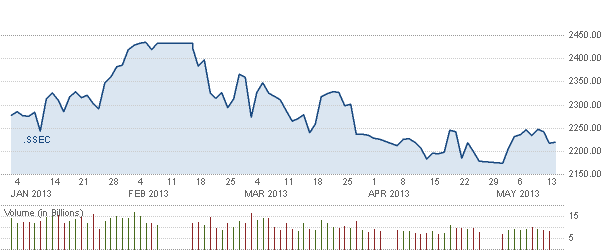The boom in equity markets from Frankfurt to New York and Tokyo has yet to reach Shanghai, which continues to lag behind its global peers. Still, analysts reckon China stocks will soon play catch-up.
China's benchmark stock index, the Shanghai Composite, is one of the few major markets moving in the opposite direction to its peers amid lackluster economic news and concerns that perhaps Beijing's policymakers won't be as forthcoming with stimulus measures as some in the market may have hoped.
(Read More: Is China Really Mulling a Lower Growth Forecast?)
The Shanghai Composite is down just over 2 percent so far this year, and about 9 percent below a nine-month high hit in February.
"The big opportunity we think for investors is the Chinese stock market, which is the laggard of recent up moves in global markets," Kerry Series, founder and chief investment officer at Eight Investment Partners told CNBC's "Cash Flow."
China's performance looks particularly weak when seen against a backdrop of surging equity markets elsewhere – Japan's Nikkei is up a stellar 42 percent this year, while the S&P 500, a broad measure of U.S. stock market performance, is up about 16 percent.
On Tuesday, mainland shares suffered their worst daily loss in three weeks after reports in the official media that China was unlikely to ease monetary policy.
(Read More: Don't Stand in the Way of the Nikkei Train)
"I think there is still some policy uncertainty in China," says Frederic Neumann, co-head of Asian economics research at HSBC.
"We have a new administration, which is expected to announce economic reforms and it's not clear which sectors will lose, which will gain," he said. "That uncertainty is weighing on the market and once we get some clarity, perhaps later in the year that could be the catalyst for the market to move up."
A new generation of leaders, who will lead China for the next 10 years, officially took over power in March after a period of transition and their policies for steering the world's second biggest economy are being watched closely.
China's economy slowed unexpectedly in the first quarter of the year and the second quarter could also be disappointing, judging by the latest economic numbers, analysts say.
More fund managers are growing increasingly bearish on the outlook for China, saying "hard landing" for China's economy and a "commodity collapse" are the biggest tail risks facing markets, a monthly survey by Bank of America/Merill Lynch showed on Wednesday.
(Read More:China Hard Landing Fears Resurface for Fund Managers)




